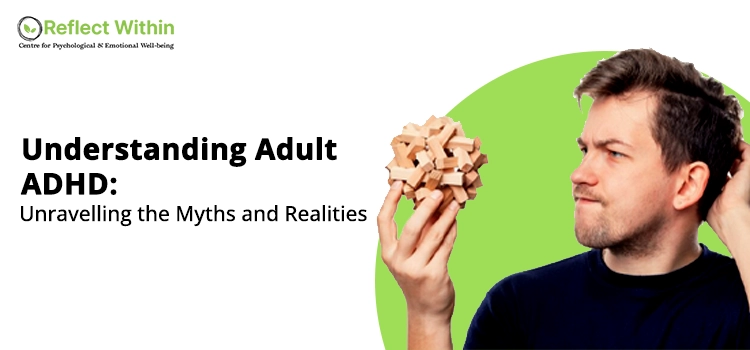Understanding Adult ADHD: Unravelling the Myths and Realities

Attention-deficit/hyperactivity disorder (ADHD) is often associated with children, but it’s essential to recognize that it doesn’t magically disappear when one reaches adulthood. Adult ADHD is a real and prevalent condition, affecting individuals in various aspects of their lives, from work and relationships to overall well-being. This article aims to shed light on the realities of adult ADHD, dispelling common myths, and providing a better understanding of this condition.
What is Adult ADHD?
ADHD is a neurodevelopmental disorder defined by persistent form of inattention, hyperactivity, and impulsivity. In the past, it was primarily considered a childhood condition, but it is now widely recognized that many children with ADHD continue to experience symptoms in adulthood. Adult ADHD is not a result of a failure to “grow out of it” but rather a lifelong condition that can have a profound impact on daily life.
Myth #1: ADHD is Just a Childhood Problem
One of the most persistent myths about ADHD is that it’s limited to childhood. In reality, ADHD often persists into adulthood, with symptoms sometimes evolving or manifesting differently as a person matures. While some children may outgrow their ADHD symptoms or learn to cope with them, many individuals carry these symptoms into their adult years.
Adults with ADHD may not exhibit the same overt hyperactivity seen in children. Instead, they often struggle with executive functions, such as organization, time management, and impulse control. This can lead to difficulties in areas such as work, relationships, and self-esteem.
Myth #2: ADHD is Over Diagnosed
It’s true that ADHD diagnoses have increased over the years, leading some to believe that the condition is over diagnosed. However, it’s essential to distinguish between an increase in awareness and a true overdiagnosis. Greater awareness has led to more accurate identification of adults with ADHD, which can help them access the support and treatment they need.
Diagnosing ADHD in adults can be challenging because the symptoms may be less noticeable and overlap with other conditions like anxiety and depression. However, a comprehensive assessment by a qualified healthcare professional is essential to reach an accurate diagnosis.
Myth #3: ADHD is a Result of Laziness or Lack of Discipline
ADHD is not a matter of laziness or a lack of discipline. It is a neurobiological condition with genetic and environmental factors at play. People with ADHD often have differences in their brain structure and function, particularly in regions responsible for attention, impulse control, and executive functions. These differences contribute to the symptoms related with ADHD.
People with ADHD may exert considerable effort to stay focused and organized, but their brain chemistry makes these tasks more challenging. Understanding and empathy from others, as well as appropriate treatment and strategies, can make a significant difference in the lives of adults with ADHD.
Adult ADHD Treatment and Coping Strategies
The good news is that ADHD in adults can be managed effectively. Treatment typically includes a combination of medication, psychotherapy, and lifestyle adjustments. Medications, such as stimulants or non-stimulants, can help improve focus and impulse control. Psychotherapy, like cognitive-behavioral therapy, can provide strategies for managing symptoms and improving emotional well-being. Additionally, lifestyle changes, including improving time management and organizational skills, can be instrumental in managing ADHD.
Adult ADHD is a real and often misunderstood condition that affects many individuals in their daily lives. It’s essential to dispel the myths surrounding it and acknowledge that it’s not just a childhood problem or a result of laziness. Instead, it’s a neurobiological condition that can have a profound impact on an individual’s life.
By increasing awareness, providing accurate diagnosis and treatment, and offering support and understanding, we can help adults with ADHD lead more fulfilling and productive lives. Recognizing the challenges they face and offering empathy and assistance is a crucial step toward better accommodating the unique needs of those with adult ADHD.
Typically the Symptoms Look like:
- Impulsivity
- Initiation of tasks
- Difficulty in decision making
- Zoning out
- Day dreaming
- Difficulty in execution and planning
- Organisation of day to day things, schedule etc.
- Fixations – if you find one task interesting, then you lose track of time and impractically devote all your time to that one task only.
- Blurting out words before other person finishes what they have to say
- Restlessness
- Difficulty with following monotonous routines.
- Difficulty in sustaining any habits or routines e.g., you join a gym and leave it in few days, you start a project and leave it half way, you take up a job and leave it before the committed tenure.
Latest Post
Categories
Book Session

















